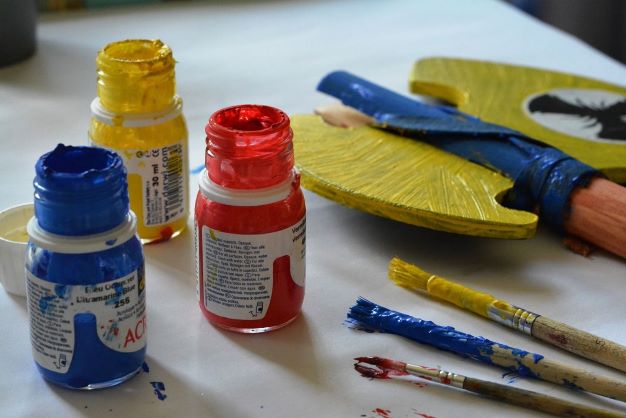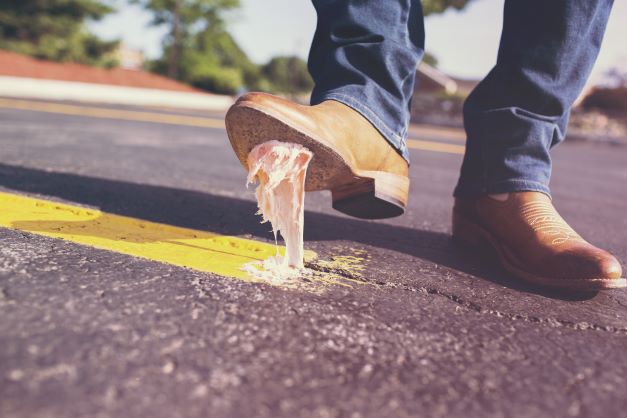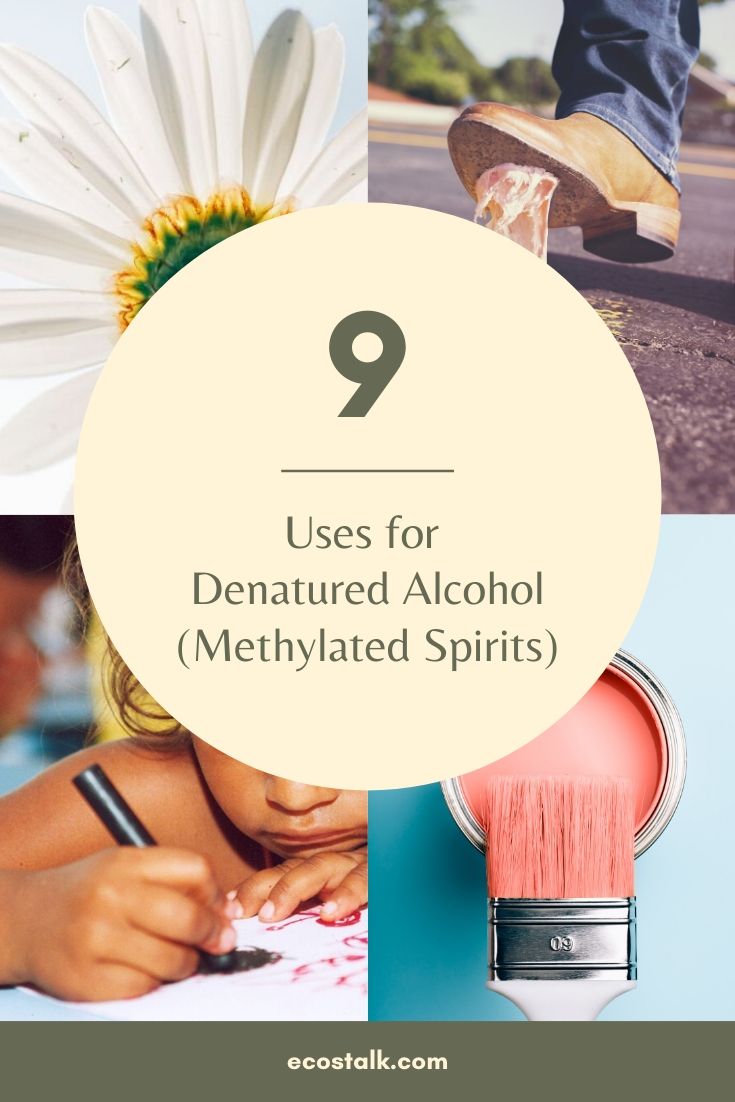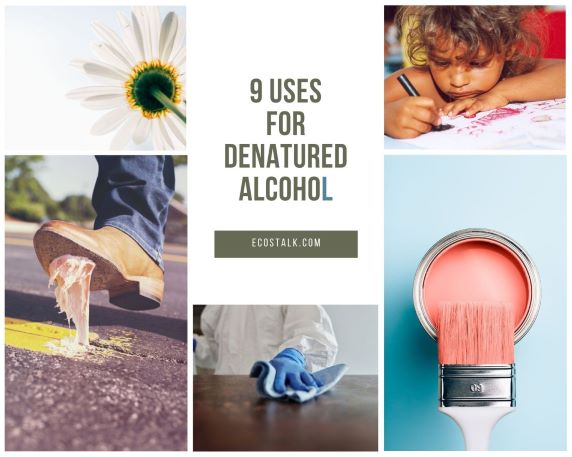Please note that I may earn a small commission from purchases made through product links in this article. As an Amazon Associate I earn from qualifying purchases.
Last updated: February 14, 2023
Denatured alcohol is a common household chemical, also known as Methylated Spirits.
The uses for Denatured Alcohol are varied and under-appreciated.
Therefore you can save alot of time and hassle by using this greener alternative for your everyday household needs.
In this article I will walk through the most common uses for denatured alcohol.
You will learn how versatile and useful this common household chemical is for all areas of your life.
Uses of Denatured Alcohol
- Heating Fuel
- Window Cleaning
- Cleaning Paint Brushes and Oil Based Paint
- Removing Makeup Stains
- Cleaning Permanent Marker, Ink marks and Grass Stains
- Removing sticky things (glues and stickers)
- Woodworking and Restoring Furniture
- Clean Plastics and Metal (even instrument strings)
- Cleaning off Crayon Marks
What is Denatured Alcohol?
Denatured Alcohol is a combination of two substances: Ethyl Alcohol or Ethanol, which is basically drinking alcohol, and an additive chemical. The additive has a strong unpleasant smell and is toxic to consume.
The most common additive is 10% Methanol, used to produce Methylated Spirits.
Denatured Alcohol usually also have brightly colored dyes to identify from other household chemicals.
Why is it More Eco-friendly?
The Ethyl Alcohol in Denatured Alcohol is derived from grains and corn starch.
The rest is Methanol which comes from wood stock.
This combination makes Denatured Alcohol a more sustainable alternative. This is because many other cleaning products are a cocktail of fossil fuels.

Mineral Spirits vs Denatured Alcohol – What is the difference?
Is mineral spirits the same as denatured alcohol? The short answer is no. Mineral Spirits, also known as White Spirit, like denatured alcohol is also a solvent.
There are two main differences between mineral spirits and denatured alcohol.
The first is that they have different combinations of hydrocarbons. The second is that mineral spirits are distilled from petroleum.
So this gives Mineral Spirits different chemical properties, and it is made from less sustainable ingredients. The primary use of Mineral Spirits is as a paint thinner.
Can I use Denatured Alcohol as Paint Thinner?
Denatured Alcohol as paint thinner is not the best choice. It can be used to clean paint from brushes, but mineral spirits or other specialised paint thinners are better suited to this task.
Denatured alcohol as a paint thinner may not be an option, but it is possible to use it to thin shellacs.
What about Rubbing Alcohol, is it the same as Denatured Alcohol?
In most countries, Rubbing Alcohol is Isopropyl alcohol, a totally different chemical compound to Denatured Alcohol.
Rubbing Alcohol, like Mineral Spirits, is also derived from non-renewable Petroleum based chemicals.
Denatured Alcohol is also toxic, and therefore should not be used interchangeably with Rubbing Alcohol in most situations.
Can I use Denatured Alcohol to make Antibacterial Hand Sanitizer?
No, definitely do not use Denatured Alcohol to make hand sanitizer, antiseptic, or any other products that come in contact with the human body.
As I mentioned earlier in this article, Denatured Alcohol is toxic to humans. You should never drink denatured alcohol and avoid contact with your skin and eyes.
Denatured Alcohol Uses include:
1. Heating Fuel
You can use Denatured alcohol as a fuel for oil heaters, because it burns more cleanly than other traditional fossil fuels.
The flame burns so cleanly that it is almost clear, letting off very little smoke and visible carcinogens into the air. The denatured alcohol fuel below can be used for this purpose.
No products found.
2. Window Cleaning
Denatured Alcohol works as a de-greasing agent. So you can remove oil based substances which are not affected by regular soaps and detergents.
Around the home use Denatured Alcohol to remove oily and greasy substances from glass for a clear, streak free finish. Dilute the denatured alcohol with 50% water for the best result.
Other Denatured Alcohol uses include cleaning smooth finishes such as tiled floors.
3. Cleaning Paint Brushes and Oil Based Paint
What is denatured alcohol used for in painting? Turns out it is great for cleaning up paint.
Cleaning paint and paintbrushes can be a major chore without the right cleaner, as the usual hot soapy water can take days to work.
After wiping off the excess paint, soak brushes overnight in denatured alcohol solution and rinse with warm soapy water the following day. Other equipment can usually be wiped down on the spot.

4. Removing Makeup Stains
Lipstick on your best white shirt? As I mentioned before, denatured alcohol is great for removing oil based substances like makeup.
Dab a small amount of the denatured alcohol on the stain, rub it in, then put the clothing through a cool wash. Be sure not to use a hot wash, as this may “set” the stain in the fabric.
5. Cleaning Permanent Marker, Ink marks and Grass Stains
Denatured Alcohol is very effective at taking ink and grass stains off fabrics.
Ever used a permanent marker on a whiteboard? Luckily Denatured alcohol can help save the day. It takes permanent ink off most smooth hard plastics (like PVC) and painted surfaces.
6. Removing Sticky Things (Glues and Stickers)
If you need to get a dodgy bumper sticker off your windscreen, Denatured alcohol is the stuff to use.
It will dissolve the glue and get rid of that sticky residue from the glass. Methylated Spirits can also dissolve other strong adhesives like superglue.
Chewing gum is another sticky problem that can be resolved by using denatured alcohol. This is best for hard surfaces like concrete.
For removing chewing gum from your body, hair or clothes it is safer to use rubbing alcohol (isopropyl alcohol) at a lower dilution i.e. 70% or lower.

7. Woodworking and Restoring Furniture
Denatured alcohol uses include manufacturing French Polish, a high quality stain applied to wooden furniture.
You can also use denatured alcohol to wipe away excess dust in your workshop. It helps to dry the wood and then evaporates much quicker than regular water.
A simple patch test with Denatured Alcohol can also tell you the difference between shellac, lacquer and varnish on a existing piece of furniture.
Denatured alcohol can be used to create custom shellacs, as it works so well as a solvent.
8.Cleaning Plastics and Metal (even instrument strings)
Unlike bleach you can use Denatured alcohol as a cleaner on plastics like PVC without destroying it.
Therefore it’s also a great cleaner for sensitive metal parts such as instrument strings, and video or tape recorder heads.
9. Cleaning off Crayon Marks
Most crayons are oil based, so you can use diluted denatured alcohol to dissolve an unwanted masterpiece on your couch or wall.

If you don’t want to use strong substance around your children’s play area, you can use diluted Rubbing Alcohol instead.
No products found.
Which Denatured Alcohol Should I buy?
Denatured Alcohol can come in many different varieties, depending on the additive. Methylated Spirits with Methanol as the additive like this one is the most common.
No products found.
Work out what percentage of Ethyl Alcohol is required for your project, and dilute the Denatured Alcohol with water if needed.
For specific advice on your needs always consult the seller or manufacturer of the Denatured Alcohol.
How to dispose of Denatured Alcohol?
Denatured Alcohol dries very quickly and easily, so you have to store it correctly or it will evaporate.
Take care to store it in shade and seal all bottles and containers to prevent evaporation. If it is taking up space, don’t just pour it down the sink! It is just as poisonous for your local water source as it is for your consumption.
Most local councils or local rubbish tips offer a household chemical clean up program that disposes of chemicals in an environmentally friendly way.
Final Thoughts
PLEASE NOTE: Denatured Alcohol is toxic and flammable. Do not consume, or avoid contact with eyes or skin, and take care not to use to clean areas where family members may regularly touch or consume / prepare food.
Wear protective gloves and clothing and always use in a well ventilated area.
For further information for safe use of Denatured Alcohol, please follow the manufacturer’s instructions on the packaging and the Material Safety Data Sheet for their product.
For more tips on green cleaning products, check out my article on the best natural stain removers for your home.



Np stands for what in mineral spirits and naphtha or kleanstripper what is {N-p}
Hi David,
NP could stand for any number of things, but most likely it is referring to the solvent being “Non-Polar”. You can find out more about Non-Polar solvents here.
Thanks,
Bel H
Is it safe to use denatured alcohol on clear plastics or optical plastics, such as headlights, gauges and tail lights. If so, what is the recommended strength or dilution ratio. Thanks.
Hi Emiliano,
Thanks for your comment, if the plastic you are cleaning is something like polycarbonate, which is commonly used for headlights, it should be fine to use diluted mehtylated spirits for light cleaning. You could start by testing a 1:1 ratio of water and methylated spirits on a small area to see its effectiveness, and if it is likely to cause any damage to the surface.
If I use it to get the paraffin/oil/mud off of my oilfield work clothes before washing them, will it make my clothes more flammable it combustible?
Thanks for sharing excellent informations. Your site is very cool. I’m impressed by the details that you have on this web site. It reveals how nicely you perceive this subject. Bookmarked this web page, will come back for extra articles. You, my friend, ROCK! I found just the info I already searched everywhere and just could not come across. What an ideal site.